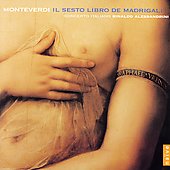One might have suspected that on grounds of national pride, to say nothing of the advantage of native fluency with the language, Italians would have been in the forefront of the “early music revival,” where early baroque repertory has been foundational. Yet, for whatever reason—the strength of the modern opera tradition, perhaps—Italy’s robust participation in the world of historical performance has developed later than others. However, the brilliant work of Concerto Italiano, under the direction of Rinaldo Alessandrini, amply and welcomingly shows how robust! With a large discography that includes eleven recordings of the works of Monteverdi already, this present recording of pieces from the Sixth Book of Madrigals is, like its predecessors, one that overwhelms with the naturalness of the performing idiom and the sensitivity of the performers.
Monteverdi’s Sixth Book of Madrigals was published in 1614, shortly after his appointment as maestro di capella at the Basilica of St. Mark’s in Venice, but the madrigals are in the main (if not totally) from Mantua, and poignantly so. Several events lend a tragic hue to Monteverdi’s later years at the Gonzaga court. In September, 1607 he suffered the loss of his wife, the singer Claudia Cattaneo, and in the next year he faced the death of the young singer Caterina Martinelli. In 1603 Martinelli had come to Mantua as a young teen, and had lived in Monteverdi’s house for several years, perhaps studying with Claudia. She died suddenly of small pox in 1608 amid preparations for the opera, Arianna, in which she was to have sung the title role.
Almost inescapably then, we tend to interpret the lamentative bent of Book Six autobiographically. Much of the volume is devoted to two large-scale works, an ensemble arrangement of the famous Lamento d’Arianna, and a Sestina (“Lagrime d”Amante al Sepolcro dell’Amata”). The first is an arrangement of the only music that survives from “Martinelli’s” opera, and the latter is a memorial work for her, requested by the Duke. In the wake of Monteverdi’s deep personal losses, these works (and others in the volume) compel us to find in them echoes of the composer’s grief.
The ensemble version of Arianna’s lament is an interesting trope of the surviving monodic version. In both forms, Arianna’s abandonment by Theseus becomes the trigger for affective music of the highest order, be it born of her despair, anger, love, or inner ambivalence. In the ensemble arrangement, however, because of the independence of the individual lines, Monteverdi’s dissonances have stronger substance than that of a single voice against the basso continuo, and this gives striking weight to a work already heavy laden. In the monodic version, however, we not only hear the vocal line as the character “Arianna,”—and thus hear things dramatically—but the solo line can claim a performance flexibility that well serves the emotional contours of the text. Concerto Italiano’s ensemble remarkably manages to sing the lament as a group with all the power, expression, and flexibility of a soloist. In fact, in hearing the ensemble, one has no doubt but that each of the singers would render the solo version with great command, and they clearly bring this understanding to a cohesive ensemble performance, wonderfully exemplified in the explosively angry sections of the fourth stanza.
Lamento d’Arianna, of course, echoes the opera. Some of the madrigals here well show the potential closeness of the madrigal and the stage, as well. “Misero Alceo,” “Batto, qui pianse Ergasto,” and :Presso un fiume tranquillo” all present scenes where the ensemble offers a narrative frame while solo or duo textures render dialogue, sometimes at great length. The degree to which the madrigal is becoming soloistic shows its continuing response to an increasingly operatic world, as does the adoption of dramatic structures. And tellingly, this development may seem to bring Monteverdi’s output into a closer unity.
It is an output that Concerto Italiano performs with stunning fluency and dramatic flair. Their sound is forward, flexible and lithe, their skill unflaggingly impressive, and their results most sensitive, dynamic and memorable.
Steven Plank
Oberlin College
